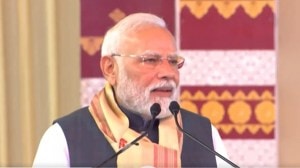DJB to recycle sewage, wastewater
The Delhi Jal Board (DJB) will soon start a pilot project to recycle wastewater, in a bid to tackle the growing shortage of water in the Capital, and the demand that is expected during the Commonwealth Games in 2010.

Pilot project to tackle shortages, future increase in water demand
The Delhi Jal Board (DJB) will soon start a pilot project to recycle wastewater, in a bid to tackle the growing shortage of water in the Capital, and the demand that is expected during the Commonwealth Games in 2010.
Apart from keeping a strict check on leakages and theft of water, the agency has decided to put its sewage treatment plants (STP) to secondary and tertiary uses within the next two years.
While it accepts there is a need to better manage the demand and supply of water, the agency wants to explore ways of recycling water going down the drains, literally. “Even though there is a problem on the management front, the people of Delhi need to change their habits as well. Ground or piped water is used for washing and construction purposes. This is also because there is no other option at the moment,” Ramesh Negi, the DJB’s chief operating officer, said.
Almost 80 per cent of water supplied turns into wastewater or sewage. As of now, Delhi has at least 1,600 unauthorised colonies, which do without a piped water supply or sewage facilities. Often, the sewage makes its way directly into the river, breeding bacteria in residential areas and also polluting the groundwater table.
“Our attempt is not to only recycle wastewater for non-potable use but also check pollution levels in the Yamuna,” Negi said. “This will be a pilot project for the next two years. We will initially choose one STP, essentially in the South, and give secondary and tertiary level treatment to sewage after primary cleaning,” he said.
At present, the agency collects sewage through drainage pipelines at the STPs, and it receives only primary treatment. “Apart from reducing the load on the river, this will leave treated residue from the STP to be used for construction, washing and horticultural purposes. We plan to have tankers for such water, which can be supplied on call,” Negi said.
Apart from this, the agency has also made similar provisions for secondary and tertiary use of wastewater from the water treatment plants in Delhi, which will substantially increase the amount of potable water generation. “Technical trials are already on at the Haiderpur water treatment plant. Once in place, the treatment of wastewater will result in a net gain of at least 8 million gallons per day at the 200 million gallons per day plant,” a senior DJB official said.
Sources said wastewater recycling plants will also become functional by April 2009 at the Chandrawal and Bhagirathi WTPs.
Photos



- 01
- 02
- 03
- 04
- 05



























